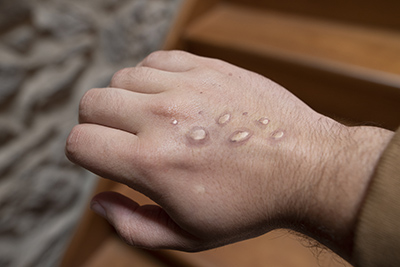
August 24, 2022
By Zachary Nan, MPH, MD Program Class of 2025
You may have heard about the current monkeypox outbreak in the United States and around the globe. This current outbreak is hitting the LGBTQ+ community particularly hard. It is important to stress that this is not a “gay” disease; though the outbreak is primarily affecting LGBTQ+ populations, anyone can become infected with monkeypox. We have already seen monkeypox infections in multiple children.
I wanted to highlight this monkeypox outbreak because it is more significantly affecting the LGBTQ+ community. This community faces many barriers to health care, including issues accessing care, fear of discrimination, and more. It is important that our LGBTQ+ students and colleagues have information about how to best protect themselves, and to inform our allies in the College of Medicine community about some of the struggles that our queer community is currently facing amidst the ongoing COVID-19 pandemic.
Recently, the White House declared this monkeypox outbreak as a public health emergency.
Monkeypox is caused by the monkeypox virus, which is related to the virus that causes smallpox (variola). Monkeypox has similar symptoms to smallpox but is much less contagious and milder in severity. It is spread primarily through skin-to-skin contact. More specifically, monkeypox is transmitted by:
- Direct contact with the bodily fluids, scabs or rash of someone infected with monkeypox
- Contact with respiratory secretions
- Touching fabrics or other objects and surfaces that have been used by someone with monkeypox
- From a pregnant person to a fetus through the placenta
With this current outbreak, we are noticing a high amount of transmission happening due to direct contact through sex and intimate contact.
Rash is the hallmark feature of monkeypox. Other symptoms might include fever, headache, muscle aches, swollen lymph nodes, chills, fatigue, or respiratory symptoms (ie. sore throat, nasal congestion or cough). The rash may initially present as small pimples or blisters and will go through several different stages, including scabs, before healing. Rashes are commonly found on or near the genitals and anus but can also appear on the hands, feet, chest, face, or around the mouth. (Learn more about the symptoms.) While there have been no deaths from monkeypox in the US since the beginning of the outbreak in May, the rash can be severely painful which sometimes requires hospitalization.
People who contract monkeypox usually develop symptoms within three weeks of their exposure to the virus. Individuals are considered infectious once they develop any symptoms and until the rash has healed, all the scabs have fallen off, and a new layer of skin has formed. This usually takes between two and four weeks.
Monkeypox can be treated with Tecorivimat (or TPOXX), an antiviral medication available through the CDC under the expanded access IND program. Your physician can call the Philadelphia Department of Public Health (PDPH) to determine if you are eligible for treatment.
If you have a rash or other symptoms of monkeypox, the current recommendation is to see a health care provider and to isolate until the rash has fully healed. If you think you have been in contact with someone with a monkeypox infection, or believe that you may be at high risk of contracting monkeypox, please call the PDPH at 215.685.5488 and select option 6 to reach the monkeypox line.
To further protect yourself, monkeypox vaccines are now available in many urban centers around the country; however, supplies are very limited. Please visit the PDPH website to learn about vaccine access and eligibility in Philadelphia: https://www.phila.gov/2022-07-19-the-latest-on-monkeypox-in-philadelphia/
You must receive two doses of the monkeypox vaccine to be considered fully protected, with the second dose given at least four weeks after the first. Due to the limited supply, a second dose cannot be guaranteed by the 28-day interval, but having the initial dose will provide important protection.
If you have any questions about monkeypox or the vaccine, please call the PDPH. The Drexel Student Health Center and most primary care providers are equipped to conduct testing, which consists of swabbing several lesions. Please share this information with others so that we can protect as many people as possible.
Sources/resources:
- The latest on monkeypox in Philadelphia: Department of Public Health. (Updated August 12, 2022). Retrieved August 18, 2022 from https://www.phila.gov/2022-07-19-the-latest-on-monkeypox-in-philadelphia/
- “Monkeypox - Signs and Symptoms.” Centers for Disease Control and Prevention, Centers for Disease Control and Prevention, 5 Aug. 2022, https://www.cdc.gov/poxvirus/monkeypox/symptoms.html
- “Biden Administration Declares Monkeypox a Public Health Emergency.” Los Angeles Times, Los Angeles Times, 4 Aug. 2022, https://www.latimes.com/politics/story/2022-08-04/biden-administration-declares-monkeypox-a-public-health-emergency
- Greenblatt, Sarah. “What You Need to Know about Monkeypox.” Drexel Home, 1 Aug. 2022, https://drexel.edu/news/archive/2022/July/what-you-need-to-know-about-monkeypox